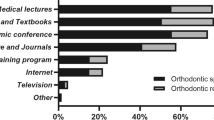Abstract
According to the importance of management of obstructive sleep apnea syndrome by otolaryngologists, this study was designed to investigate knowledge, attitudes and practice of junior and senior residents of otolaryngology and evaluate the effect of current residency training program on choosing the first lines of treatment. A total of 110 residents of otolaryngology were selected. Our study tools were obstructive sleep apnea knowledge and attitudes (OSAKA and OSAKA-KIDS) questionnaires. The participants were classified as junior and senior. Senior residents had significantly higher total knowledge score for OSAKA based on independent t test (12.73 Vs. 10.52). No significant difference was observed for OSAKA-KIDS (11.31 Vs. 10.69). The most frequent choice for the first line was CPAP (63.8%) and weight loss (41.5%) among junior and senior residents, respectively. Although the knowledge of otolaryngology residents increased during their program, the choice of first line treatment in obstructive sleep apnea was different between junior and senior residents. We found a need for further multidisciplinary education for residents especially in the management of sleep apnea particularly toward CPAP usage and this syndrome in pediatrics.
Similar content being viewed by others
Data Availability
It is available from the corresponding author on reasonable request.
Abbreviations
- AHI:
-
Apnea–hypopnea index
- OSAKA:
-
Obstructive sleep apnea knowledge and attitudes
- OSAKA-KIDS:
-
Obstructive sleep apnea knowledge and attitudes in children
- CPAP:
-
Continuous positive airway pressure
- OSA:
-
Obstructive sleep apnea
References
Gamaldo AA, Beydoun MA, Beydoun HA et al (2016) Sleep disturbances among older adults in the United States, 2002–2012: Nationwide inpatient rates, predictors, and outcomes. Front Aging Neurosci. https://doi.org/10.3389/fnagi.2016.00266
Peppard PE, Young T, Palta M, Skatrud J (2000) Prospective study of the association between sleep-disordered breathing and hypertension. N Engl J Med. https://doi.org/10.1056/NEJM200005113421901
Bahammam A, Delaive K, Ronald J et al (1999) Health care utilization in males with obstructive sleep apnea syndrome two years after diagnosis and treatment. Sleep 22:740–747. https://doi.org/10.1093/sleep/22.6.740
Urquhart DS, Hill EA, Morley A (2017) Sleep-disordered breathing in children. Paediatr Child Heal (United Kingdom) 27:328–336
Zhang XM, Shi J, Meng GZ et al (2015) The effect of obstructive sleep apnea syndrome on growth and development in nonobese children: A parallel study of twins. J Pediatr. https://doi.org/10.1016/j.jpeds.2014.11.060
Kaditis AG, Alvarez MLA, Boudewyns A et al (2016) Obstructive sleep disordered breathing in 2- to 18-year-old children: diagnosis and management. Eur Respir J. https://doi.org/10.1183/13993003.00385-2015
Capdevila OS, Kheirandish-Gozal L, Dayyat E, Gozal D (2008) Pediatric obstructive sleep apnea: complications, management, and long-term outcomes. Proc Am Thorac Soc 5:274–282
Kramer NR, Cook TE, Carlisle CC et al (1999) The role of the primary care physician in recognizing obstructive sleep apnea. Arch Intern Med. https://doi.org/10.1001/archinte.159.9.965
Schotland HM, Jeffe DB (2003) Development of the obstructive sleep apnea knowledge and attitudes (OSAKA) questionnaire. Sleep Med. https://doi.org/10.1016/S1389-9457(03)00073-X
Uong EC, Jeffe DB, Gozal D et al (2005) Development of a measure of knowledge and attitudes about obstructive sleep apnea in children (OSAKA-KIDS). Arch Pediatr Adolesc Med 159:181–186
Keikhaei B, Moradi-Choghakabodi P, Rahim F et al (2018) Neonatal screening for sickle cell disease in Southwest Iran. SSU 8(2):105–110
Halvorson DJ, McKie V, McKie K et al (1997) Sickle cell disease and tonsillectomy: preoperative management and postoperative complications. Arch Otolaryngol - Head Neck Surg. https://doi.org/10.1001/archotol.1997.01900070033005
Cherrez Ojeda I, Jeffe DB, Guerrero T et al (2013) Attitudes and knowledge about obstructive sleep apnea among Latin American primary care physicians. Sleep Med. https://doi.org/10.1016/j.sleep.2013.06.005
Chérrez-Ojeda I, Calderón JC, Fernández García A et al (2018) Obstructive sleep apnea knowledge and attitudes among recent medical graduates training in Ecuador. Multidiscip Respir Med. https://doi.org/10.1186/s40248-018-0117-8
From P, Scholarship O, Reserved AR (2013) An assessment of the knowledge and attitude of graduating medical students in Lagos, Nigeria, regarding obstructive sleep apnea. Ann Am Thorac Soc. https://doi.org/10.1513/AnnalsATS.201412-561OC
Williams NJ, Nunes JV, Zizi F et al (2015) Factors associated with referrals for obstructive sleep apnea evaluation among community physicians. J Clin Sleep Med. https://doi.org/10.5664/jcsm.4356
Li H, Wang J, Ouyang B et al (2016) Attitude and knowledge of Chinese physicians towards obstructive sleep apnea syndrome. Int J Clin Exp Med 9:3433–3440
Corso RM, Sorbello M, Buccioli M et al (2017) Survey of knowledge and attitudes about obstructive sleep apnoea among Italian anaesthetists. Turkish J Anesth Reanim. https://doi.org/10.5152/TJAR.2017.51423
Goyal A, Aswin P, Pakhare AP (2018) Poor knowledge and attitude regarding Obstructive Sleep Apnea (OSA) among medical students in India: a call for MBBS curriculum change. Sleep Vigil. https://doi.org/10.1007/s41782-017-0028-3
Jokubauskas L, Pileičikienė G, Žekonis G, Baltrušaitytė A (2018) Lithuanian dentists’ knowledge, attitudes, and clinical practices regarding obstructive sleep apnea: a nationwide cross-sectional study. CRANIO J Craniomandib Pract 37:238–245
Lapaige V (2010) “Integrated knowledge translation” for globally oriented public health practitioners and scientists: framing together a sustainable transfrontier knowledge translation vision. J Multidiscip Healthc. https://doi.org/10.2147/jmdh.s5338
Davis DA, Thomson MA, Oxman AD, Haynes RB (1995) Changing physician performance: a systematic review of the effect of continuing medical education strategies. J Am Med Assoc 9:700–705
Abdel Shaheed C, Graves J, Maher C (2017) The effects of a brief educational intervention on medical students’ knowledge, attitudes and beliefs towards low back pain. Scand J Pain. https://doi.org/10.1016/j.sjpain.2017.04.002
Valerio TD, Heaton K (2014) The effects of an online educational program on nurse practitioners’ knowledge of obstructive sleep apnea in adults. J Am Assoc Nurse Pract. https://doi.org/10.1002/2327-6924.12097
Acknowledgements
We thank the holders of international congress of Iranian society of otolaryngology, head and neck surgery, 27-30 Nov 2018.
Author information
Authors and Affiliations
Corresponding author
Ethics declarations
Conflict of interest
The authors report no conflicts of interest.
Additional information
Publisher's Note
Springer Nature remains neutral with regard to jurisdictional claims in published maps and institutional affiliations.
Rights and permissions
About this article
Cite this article
Erfanian, R., Sohrabpour, S., Najafi, A. et al. Effect of Otolaryngology Residency Program Training on Obstructive Sleep Apnea Practice. Indian J Otolaryngol Head Neck Surg 74 (Suppl 3), 4579–4586 (2022). https://doi.org/10.1007/s12070-021-02718-2
Received:
Accepted:
Published:
Issue Date:
DOI: https://doi.org/10.1007/s12070-021-02718-2




